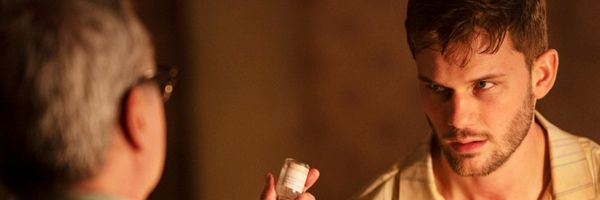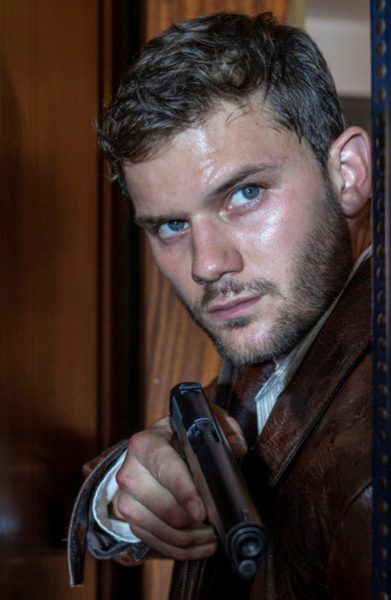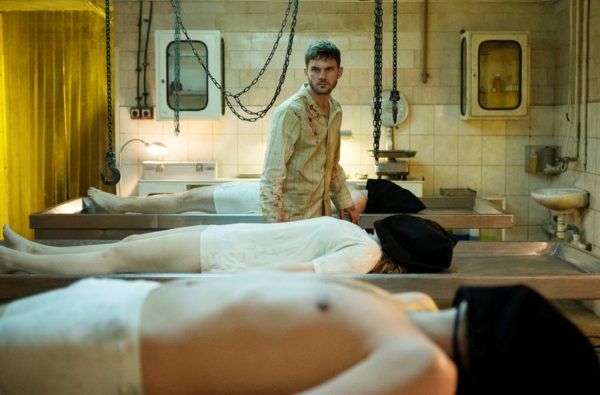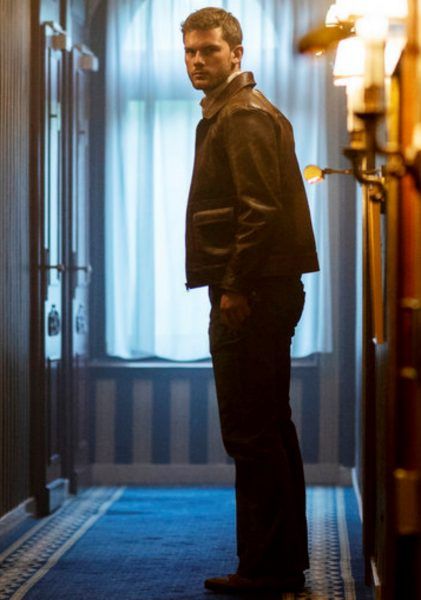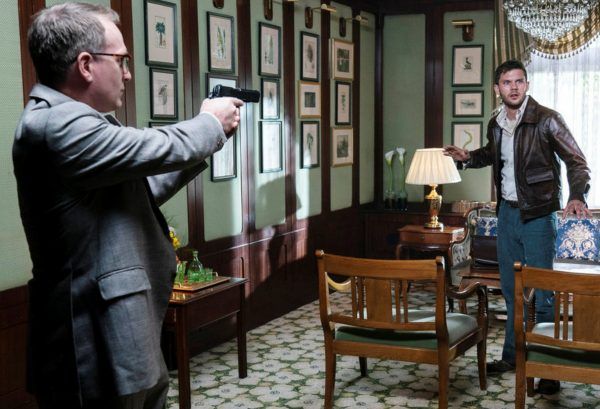From show creator Tim Kring, the USA Network drama series Treadstone explores the origin story and present-day actions of the infamous covert program that turns recruits into unstoppable superhuman assassins. Having created super spy Jason Bourne, the CIA black ops program Operation Treadstone is now seeing sleeper agents across the globe mysteriously resuming their deadly missions.
During this 1-on-1 phone interview with Collider, British actor Jeremy Irvine (who plays J. Randolph Bentley, a spy sent by the CIA to eliminate a key target, but then surprisingly finds himself in the middle of an international conspiracy) talked about why he was a huge fan of the Bourne movies, the appeal of this series, shooting such brutal and physical fight scenes, the most challenging and most fun days of the shoot, the process of discovering all of the twists and turns, how he felt when he learned where things would end up this season, what made this one of the most collaborative jobs he’s ever been a part of, and whether he’d like to continue telling this story for a bit.
Collider: Is this one of those shows, because of the big action and the spy drama aspect, that you dream about getting to do, when you’re thinking about becoming an actor?
JEREMY IRVINE: Yeah, it’s the progression of what I used to run around pretending to do in my garden, when I was a boy. It’s great. I was always a huge fan of the Bourne movies, so to actually be in something in that vein, to progress the Bourne stories is really cool. And there’s a lot there. There are four or five storylines that it goes in. Episode 3 has everyone in it, and then Episodes 4 and 4 focus on Doug (Brian J. Smith) and the Korean storyline, and then Episodes 6 and 7 switches to me and Tara (Tracy Ifeachor). So, it gets easier to follow, as we go through it. The first few set up everyone’s storylines, and then certain episodes go back and forth in focusing on one or two of the storylines at a time.
You’ve talked about having been a fan of the films. What was it about the films that most appealed to you about them, and what do you think the series has taken or been inspired by, from the films, in its development?
IRVINE: Growing up, before Bourne, I was watching James Bond, and stuff like that. Bourne suddenly made it very visceral and real, and it’s that grounded action that I liked in the Bourne films. What we take from Bourne films, specifically, in the TV show and try to build upon and go further with is that visceral action. All of the martial arts that we have in there is not just movie techniques. Everything in there is real and it’s taught to people as martial arts techniques. So, for me, my training started two months before filming the series. They spent two months teaching me martial arts, before we even into any of the choreography. You’ve got these quite heightened storylines that are very grounded, in a hype-realistic sense. I remember seeing some of the first fights in The Bourne Identity and thinking, “I’ve never seen anything like that.” There was no music. It was just all visceral. I think we take that and really run with it. There’s a lot of fighting
At the same time, were there also things that you intentionally wanted to do with this character to set him apart from Jason Bourne?
IRVINE: Well, I’m not playing Jason Bourne. I’m playing a different character. What’s great is that I get to tell the origin story, and it’s a period of history which is fascinating. During the Cold War, the Americans learned that the Russians were trying to do these mind control experiments. The Russians had no actual success with it, at all, but the Americans thought they might, so they had to try to set up their own program. It is sort of based on real CIA and Russian experiments that happened, but we’re assuming that it worked. The reality of it is that it didn’t quite work as well as we’re saying the Treadstone program worked, but this character is based in a very real part of history, in West Berlin. When we find him, he’s a seasoned soldier, but he’s also got a vulnerability to him. A lot of it was about, yes, we’ve seen this guy and he’s highly trained, but he’s also vulnerable and real, so that you can care about him. And so, it was about finding those moments to show his real vulnerability and the emotional depth to him, as well as all of the kick-ass action stuff.
It seems like there’s a whole extra added layer of challenge to fight scenes, when you’re also supposed to look like somebody who is highly trained and very experienced.
IRVINE: Yeah, exactly. I’m very lucky, I’ve become very good friends with my stunt double because we’ve spent a lot of time together, and he’s awesome. He would teach me all of the fights with the other stunt guys, but I’d be quite offended, if they went, “Okay, we need to get the double in.” I’d be like, “Ah, shit, I need to work harder.” It was all part of trying to keep it real, but we really pushed the envelope with what was possible to do without using special effects. It was all pretty much done live, in front of the camera. There were a lot of injuries, at the start, but that happens when you’re really pushing things. We were definitely pushing the envelope of what’s possible to do live.
Do you enjoy shooting such brutal and physical fight scenes?
IRVINE: Yeah, I think that’s a lot more interesting. My own personal taste has always been things like the Bourne movies. I’m more of a Bourne guy than a Marvel, big, epic guy, so it definitely plays to my tastes and what I enjoy. I also really enjoyed learning from the guys that were teaching us. A lot of the guys were ex-military, and we learned all of the weapon disarms for real, and then learned how to fake it and how to make it look good on camera. There’s a scene where I escape from the CIA headquarters, and all of those disarms are real things that are taught to special forces. I really enjoyed myself. I became an actor, but when I left school, I wanted to join the Army, so I tried to join the Army, but they wouldn’t let me in. So, it was great that I got to play that. I really enjoyed it.
Has there been a most challenging day of the shoot, and has there been a most fun day of the shoot?
IRVINE: Yeah, definitely. In terms of fun, all of the big action stuff is a lot of fun to do. It’s very exciting, but it’s exhausting. I’ve really enjoyed that side of it. But the stuff that’s most fun to me, as an actor, are probably the scenes where it’s just you and someone else in a room, and you have to create all of the drama and all of the tension, just with the two of you, having a scene together. It was such a privilege to have that opportunity to play a character with that depth and have these really high stakes scenes. In terms of the hardest days on set, we started filming the pilot in Budapest in January and February, and it was minus nine Celsius. I don’t know what that is in Fahrenheit, but it’s pretty fucking cold, and I was running around in my underwear, around these rooftops. That scene in the pilot, where I was running around the rooftops, was actually running around the rooftops in the snow and the ice, with no clothes on. So, that was definitely the hardest part.
With a show like this, it’s important to unravel the mystery of it all, so how much were you told about what the series would be and who this character could become, from the beginning, and how much of it was really a learning process, along the way?
IRVINE: Well, that was quite interesting, actually, ‘cause I’d never started a job where I didn’t have the entire script, at least some time before. This is my first TV job. I’ve only ever done movies, where you’ve read the script usually before you’ve even met for the project, and you’re already coming up with ideas. On this, we had the pilot, but nothing else, and then were given episode by episode, as we went. We didn’t know what was coming up next. Actually, at first, I remember asking to have a meeting with Ben Smith, the producer, and Tim Kring, the other producer, and saying, “I’m unhappy with this. It’s not what I’m used to. I come from a theater background, where you rehearse for weeks beforehand, and you really get into the text, and this really makes me feel very uncomfortable.” They reassured me, and we sat down and spoke a lot about the character. They said, “This is how we wanna do it.” And actually, it was great because it meant that you were just focusing on one episode at a time, and it’s really exciting when each script comes out. The whole series, for me, is set over two or three weeks, so I really got to live in that moment with it, genuinely not knowing what was gonna happen next. And I was convinced I was gonna die, at the end. I had the same personal trainer on this, as all of the other actors and the producer, and I’d say, “I’m sure I’m gonna die. I just know I’m gonna die in Episode 10.” We were waiting for the script for Episode 10, and I was just waiting for the call to tell me that was it. And then, my personal trainer told the producer that’s what I’d been saying, and he gave me a call and said, “That’s all right, you’re not dying. There’s more to come.”
Without revealing any secrets, as you started to learn some of that yourself, what was your reaction to getting some of those answers, or seeing where things would end up, by the end of the season?
IRVINE: Well, until Episode 10, you really don’t know where it’s all gonna go, and there are some really good twists and turns, as well. The thing that I love the most about it, especially coming from film, is that you finish a movie, after however long the shoot is, and you go, “Oh, that’s who that person is. Now, I understand that character, and I wish I could go back and do it all again, knowing what I know now.” With this, we shot nearly for a year – it was over 10 months – and I really got to become that character, over those months, and really live him. So, learning where he was going felt quite personal, when each episode came in.
By the end of the season, did you feel like you had a sense of where things could go next? Have you talked about where things could go next, for the story and for your character?
IRVINE: No, I haven’t. Whenever I try to get secrets about where the show is going, they’re very secretive about it all, so I don’t know. Tim Kring is the captain of the ship, and I knew, from within a couple of weeks of working with him, that he was not gonna stand for anything less than excellence, in terms of what was gonna go into scripts and what was gonna go in front of camera, and that was very reassuring. So, I don’t know what’s coming up, but I’m in good hands. It was really collaborative, as well. I was told that, doing these big American TV shows, you’re given the lines and you have to say them exactly as written, and that’s just the way it is. But there were nights that myself, and Ben [Smith], and the writers would spend two or three hours, hashing out bits of dialogue. Getting to be a part of that crazy process was a real privilege. It’s one of the most collaborative jobs that I’ve ever been a part of, coming up with costume ideas and stuff like that, as well.
Are you going to work on something while you’re waiting to hear what’s going on next with the show?
IRVINE: We’ll see. I’m sorting that out. I only just got back to London, so I need to remind my friends and family what I look like, and then, I think the agents are wanting me to do other things. At some point, I’m gonna have to start answering emails and looking at other stuff. We’ll see. It’s the longest job I’ve ever done, and it’s been a long time to be away from friends and family. So, as much fun as work is, I think I could do with a few weeks to see if my dog remembers me, and things like that, before I see about other jobs.
When you do a project like Treadstone, does it inspire you to want to keep doing action projects, or are you looking to do a quiet little comedy next?
IRVINE: I would love to do something that’s a comedy. I’d love to do comic stuff. One thing that I don’t have a lot of, in Treadstone, is jokes. We’ll see. I really liked the long form creative process of this. I’ve done theater before, where you rehearse for three or four weeks, and then you have three or four months of doing the play, and by the end of it, you know your character, inside and out, and it feels like you’ve really got your teeth into it. You often don’t get that on a film. You show up and you’re meeting the actress, for the first time, and you’re playing characters that have been in a relationship for 10 years, and you get three or four takes, and it’s over, before you know it. So, I really enjoyed the long form process of doing high-end TV like this. So, we’ll see what’s next. I’d love to do another one of these. We shall see.
Treadstone airs on Tuesday nights on the USA Network.

